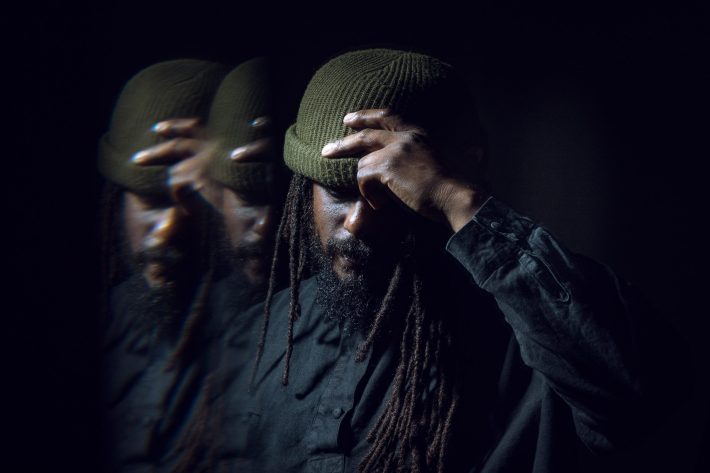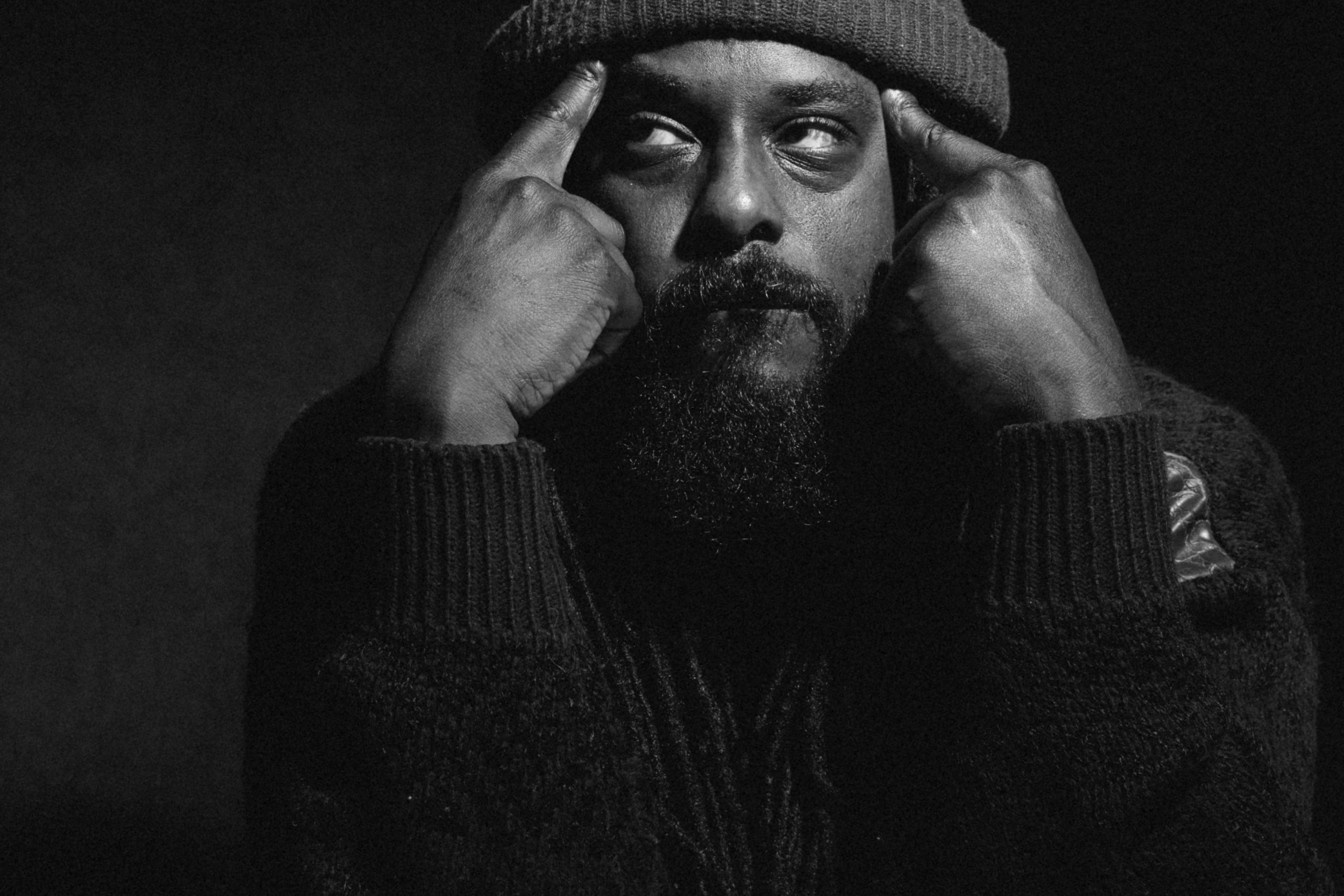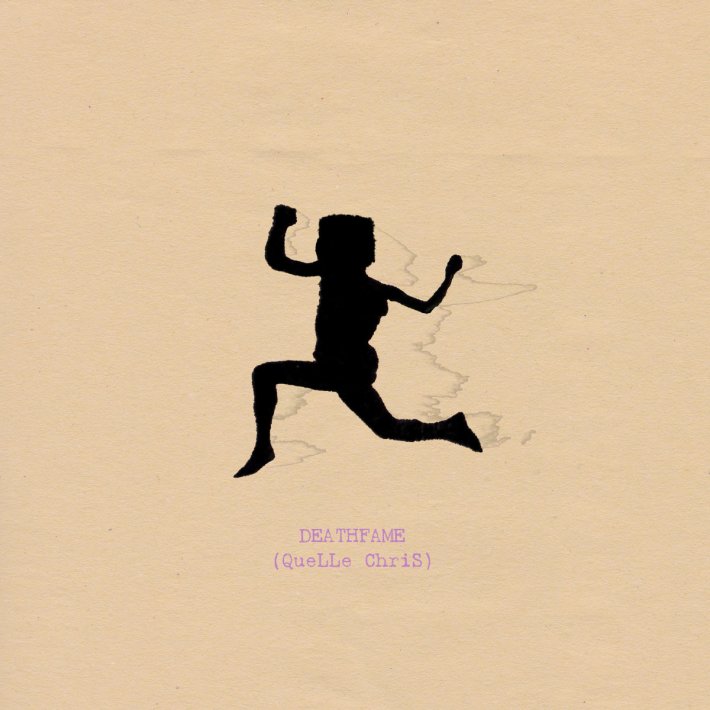The eyes are the most expressive instrument a human being has. They can convey pleasure, menace, and sexual attraction. It's in the eyes where people look for good, or for something compelling. It's where people express sorrow, where you can feel the full weight of whatever story the lips are telling. A Negro's eyes are the most pained, the most dilated. They've either seen it all or are beginning an awakening of cosmic proportions.
When you look at veteran rapper Quelle Chris' eyes, they twinkle. It's the glint you get from men who've been through tribulations and memories fit for a HBO show. As we sit at a restaurant in Baltimore, Quelle tells me about the last two years of his life. He's been living in Baltimore since the peak of the pandemic, though he was still in New York when George Floyd's death set off protests nationwide. "New York was crazy at the time," he says. "There was a lot of personal stories that I could get into, but for one, we were living near the police station, and during the protest they burned down the motherfucker. During the pandemic, we couldn't do no shows either, so it was like: What's the point of being here?"
So, Quelle and his family — he is married to Jean Grae, a brilliant emcee in her own right — moved to Baltimore. "My wife's family is here and I had to get out of New York," Quelle tells me. Quelle Chris is a rapper who specializes in obfuscating expectations. This Negro will not do what you assume he'll do, nor will he cater to hip-hop tradition. He's not mysterious, but he is soft spoken. The world has thrown him a magnitude of ordeals; singing about them is just what Quelle does. He rapped about death on "Living Happy," one of the favorites from 2020's Innocent Country 2, and took on capitalism on "Gold Purple Orange" on 2018's Everything's Fine, his joint album with Jean Grae.
On his new album DEATHFAME, released in May, Quelle is talking about the blues. More specifically, his blues. Although his albums often translate his struggles into comedy, this one is more solemn. Backed by his own beats plus dignified, unflappable production from Chris Keys — the keyboard sounds on "Alive Ain't Always Living" are so nakedly raw you want to put a warm blanket over them — Quelle reaches new heights while building upon the formula that has gotten him acclaim.
He maintains that the overload of bad news in American society is not what drove him to make this record. "I think this one is more about human nature and the things that we tend to fixate upon are the things that are healthy or unhealthy — particularly in the case of this vein, the idea of fame and how it is to be famous on how it is to want fame, or how it is to feel that people think you're famous, but you you live life and life has happened in the same way to you as it does to anybody." Still, DEATHFAME is congruent with this moment's downtrodden proletarians. Current events might not be discussed, but they exist as an unspoken context, like Derek Jeter and biraracialness.
While Quelle is based in Baltimore now, and has spent time living in Chicago and New York, his native Detroit is a huge factor in this record. It's an album of the lost; the production embraces the city's anguish over the industrialism that perished without a trace. When I ask him what he took from his home city, Quelle reaches back in his mind and lucidly remembers everything. "Every day," he begins. "I mean, anything I am from my parents or my brothers are technically things I took from Detroit. When I went to St. Louis and came back I was no longer a kid they saw from the sidelines. There was a lot of influences going around and that made Detroit real to me."
You name the rapper, Quelle's had history with them. Roc Marciano, Action Bronson, Danny Brown, billy woods, Elucid, Earl Sweatshirt. On DEATHFAME he adds names like Navy Blue and Pink Siifu to that list. To see Quelle is to see your neighbor. He takes the personality of Little Brother emcee Phonte and doubles down on it. Not only is Quelle an everyman, he is a man whose problems reverberate through the listener. He's self aware but, because of his hieroglyphic lyrics, still distant enough not to be an oversharer. I ask him how much he believes in the idea of fate. "I believe in multiple fates. Every action has something that happens after. It's the acceptance of that which makes the fate."
He is a recovering alcoholic, something that particularly inspired the genuine appreciation of human life heard on "Alive Ain't Always Living." It's also the reason for the weariness on the record. He's dealing with his demons, taking it one day at a time. "I'm still getting things in order. Part of why I wanted to get to Baltimore, with family here, is that I wanted to get a better understanding of my health and how important it is. What is crazy, though, is that if you think about it too much, you are liable to pick up the bottle again." When I ask Quelle about days he has been proud of himself after getting sober, the answer is cliché but appropriate: "Every day I am able to not drink, it is a success. Every time you get on the right path."
Rappers rarely are able to talk in the clear way that Quelle Chris is right now. Men are hedonistic. We eat self-laceration and self-indulgence. Devour it. There's not a care in our minds. Rappers are the embodiment of this. Everything in the genre tends to be maximal, including the lifestyle. You don't get the hunger of rappers without their inability to settle down. For every Quelle, there is an artist you worry about in the back of your mind, wondering if today will be the day you hear people crying the blues on TMZ after a seizure or worse.
The fragility of life in rap is not normal. It's a symptom of Black American life. It's the weight that stretches back generations. The serenity of gracefully entering old age does not always exist for the Black man. If you are able to better your livelihood while still making the best music of your life, you've done what many others couldn't do. At the same time, there's a guilt, or a responsibility, in that. The Negro man feels the weight of his fallen brothers. Quelle's work reflects that burden. As we end the interview, Quelle asks about my life. We're out of time but he wants to learn more about me next time. "Let's do that," I tell him. We his listeners are as grateful for Quelle's fate as he is for himself.








